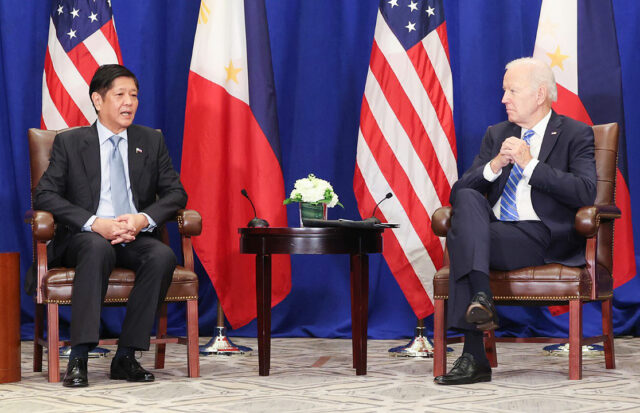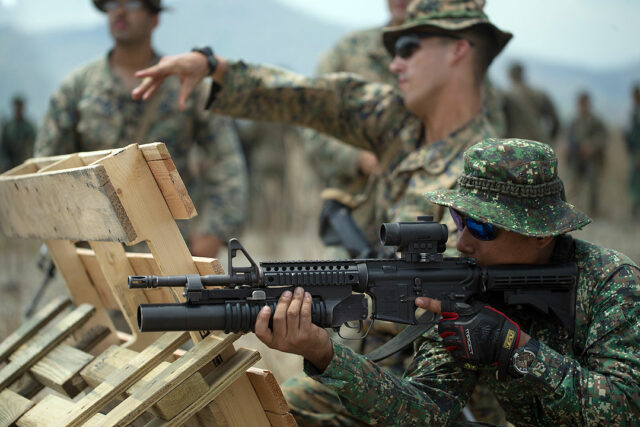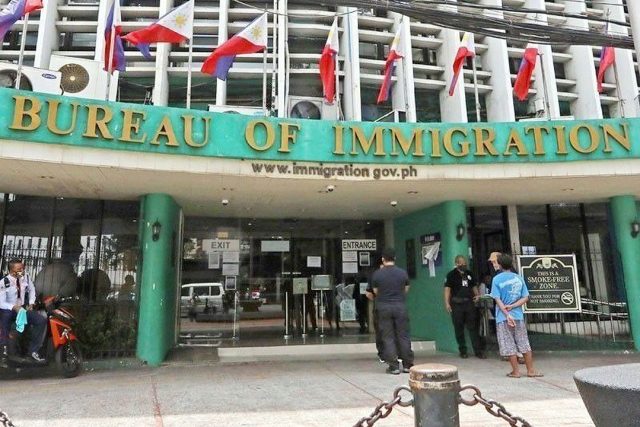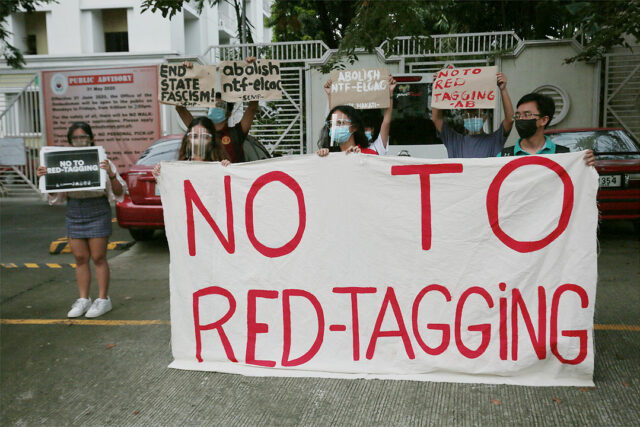Philippines, US to deepen work vs ‘foreign information manipulation’

SENIOR officials from the Philippines and United States have agreed to set up dialogues on cyber-digital space and democracy, while deepening collaboration on countering fake foreign narratives, according to a joint statement posted on the US Department of State website.
Officials from both sides, who met in Washington, D.C. on April 22 and 23, said they have agreed to boost their cooperation against “foreign information manipulation.”
The State Department’s Global Engagement Center, which tackles propaganda and disinformation, defines the practice as efforts by a foreign government to promote “biased information.”
It linked the term to China in a 2023 report, accusing it of suppressing “critical information that contradicts its desired narratives” on issues including the dispute in the South China Sea.
The parties also opposed any threat or the use of force against the territorial integrity or political independence of any state, alluding to China’s growing assertiveness in the waterway.
They also “reaffirmed the importance of peace and stability across the Taiwan Strait,” while committing to advance a free, safe and open Indo-Pacific region that is “inclusive, prosperous, secure and based on international law.”
The parties likewise agreed to continue talks on finalizing additional sites in the Philippines and enforcing their Enhanced Defense Cooperation Agreement (EDCA), with the US Defense department committing to invest $128 mil-lion in infrastructure.
They will also continue discussions on prepositioning United States Agency for International Development (USAID) disaster relief commodities for Philippine civilian disaster response authorities at key EDCA sites.
The Philippines and US are also expected to conclude a “general security of military information agreement” by yearend, according to the statement.
Philippine and US officials agreed to meet in Manila around September or October for a maritime dialogue.
Security analysts on Wednesday criticized the paltry share of the Philippines in the United States’ $95-billion (P5.5 trillion) aid package — mostly military assistance to Ukraine, Israel and Taiwan and US partners in the In-do-Pacific region — saying Manila should demand more as it deals with China, the world’s biggest naval power.
The Philippines will get $500 million in aid under a US Senate-approved bill, compared with $61 billion for Ukraine’s efforts against Russia’s invasion and $26 billion for Israel and humanitarian aid for civilians in conflict zones around the world.
The Philippine share is part of the $8.12 billion allotted to “counter communist China” in the Indo-Pacific region.
With a 79–18 vote in the US Senate, the proposed package that President Joseph R. Biden is expected to sign this week is seen as a bipartisan victory, getting support from most Democrats and traditional Republi-cans wary of ultra-nationalist sentiments among their ranks.
The House passed its version of the proposed package on Saturday in the form of individual bills combined for Senate action.
President Ferdinand R. Marcos, Jr. in February said the Philippines was on the frontline of a battle for regional peace as it faces China’s growing assertiveness in the South China Sea.
China claims the waterway almost in its entirety, including waters that fall within the Philippines’ exclusive economic zone.
It continues to block resupply missions at Second Thomas Shoal, where Manila grounded a World War II-era ship in 1999 to assert its sovereignty, by firing water cannons at much smaller Philippine boats.
President Ferdinand R. Marcos, Jr. has expanded US access to four more military sites in the Philippines on top of the five existing ones.
He told foreign journalists in Manila this month that he does not plan to expand US access to military bases in the Philippines.
Mr. Marcos met with US President Joseph R. Biden and Japanese Prime Minister Fumio Kishida in the nations’ first trilateral summit in Washington this month. — J.V.D. Ordoñez
Congressmen seek probe of US missile system use in Balikatan war games
By Kenneth Christiane L. Basilio
A GROUP of militant lawmakers on Wednesday filed a resolution seeking to investigate the missile system brought by the United States in the country for annual war games, saying it could potentially be carrying nuclear warheads.
“These Balikatan exercises need transparency because we don’t know if these Tomahawk missiles have nuclear warheads, which is against our Constitution,” Party-list Rep. France L. Castro said in a statement in Filipino.
The US brought a mid-range missile system for the Balikatan or shoulder-to-shoulder military exercises with the Philippines that started this week.
“There is a need for transparency on Enhanced Defense Cooperation Agreement sites as well as the equipment… the US brings into the Philippines as Tomahawk cruise missiles may carry… nuclear warheads,” according to House Resolution No. 1688.
“The deployment of such missile systems not only endangers the lives of Filipinos but also… undermines peace and stability in the region,” political activist Antonio L. Tinio said in the same statement.
China has expressed “grave concern” over the move to bring the missile system into the country.
“The US move exacerbates tensions in the region and increases the risk of misjudgment and miscalculation,” China Foreign Ministry spokesman Lin Jian told a news briefing last week.
The United States is using the annual drills to advance its military interests in the Asia-Pacific region, according to the resolution.
“The Balikatan exercises only exacerbate warmongering and seek provocation against China,” Ms. Castro told BusinessWorld in Filipino in an interview on Wednesday.
Don Mclain Gill, who teaches international relations at De La Salle University in Manila, said the war games improve the interoperability of the Philippine military with its allies.
“With or without China, such drills would have continued,” he told said in a Facebook Messenger chat this week. “However, China’s intensified belligerence in the West Philippine Sea adds more importance to Balikatan given the Philippines ‘ defense-oriented policy.”
Ms. Castro said the House should prioritize the probe.
The Senate and House of Representatives have separately passed several bills that seek to boost Philippine claims in the South China Sea, including one that defines the maritime boundaries of the country.
Also approved was a measure that seeks to encourage investments in the country’s local defense industry.
Political analysts said these measures could help deter Chinese military expansionism in the waterway.
“Lawfare needs a proper perspective,” Joshua Bernard B. Espeña, vice-president at the Manila-based International Development and Security Cooperation, said in a Facebook Messenger chat.
“It is not a silver bullet, but rather one of the many tools,” he added, referring to the use of legal action to cause problems for an opponent.
The government of President Ferdinand R. Marcos, Jr. is “clearly using international law and international relations as tools to assert our position,” Michael Henry Ll. Yusingco, a policy analyst and senior research fellow at the Ateneo de Manila University Policy Center, said via Messenger chat.
“He is clearly making an effort to internationalize the West Philippine Sea issue, which means putting the 2016 arbitral ruling at the very center of our position,” he added.
China has ignored the decision by a United Nations-backed court in the Hague voiding its expansive claims in the South China Sea.
Almost half of Pinoy families feel poor — SWS poll
ALMOST half of Filipino families feel poor, mostly unchanged from December, according to a Social Weather Stations (SWS) poll.
SWS noted that based on the March poll, 46% of the families or about 12.9 million thought they were poor, compared with 47% or about 13 million in December. It added that 30% rated themselves as borderline poor, while 23% said they were not.
“Compared with December 2023, the percentage of poor families hardly changed from 47%, while borderline families barely moved from 33%, and not poor families rose slightly from 20%,” the pollster said.
SWS said there was a slight decrease in the self-rated poverty figure in Mindanao and Metro Manila, while it rose in the Visayas and steadied for the rest of Luzon.
“As of March 2024, the percentage of self-rated poor families was highest in the Visayas at 64%, followed by Mindanao at 56%, Balance Luzon at 38% and Metro Manila at 33%,” it added.
In December, self-rated poverty was 61% in Mindanao 37% for Metro Manila, 58% for the Visayas and 39% for the rest of Luzon.
Meanwhile, the borderline fell in the Visayas to 25% from 35%, and hardly changed in Metro Manila at 27% from 29%, at 31% from 34% for the rest of Luzon and at 35% from 32% for Mindanao.
At the same time, Filipinos who thought they were not poor rose in Metro Manila to 41% from 35%, while it hardly changed at 30% from 27% for the rest of Luzon, at 11% from 7% for the Visayas and at 9% from 6% for Mindanao, SWS said.
SWS interviewed 1,500 adults on March 21-25 for the poll, which had an error margin of ±2.5 points. — Norman P. Aquino
DTI confiscates vape products worth P31M
THE DEPARTMENT of Trade and Industry (DTI) said that it confiscated P31 million worth of vape products from last February 9 to April 23 for violating the Vape Law, or Republic Act (RA) No. 11900.
In a statement, the DTI said that it has monitored 84,523 physical and online vape establishments during the period, which led to the confiscation of 65,865 vape units.
“Of the monitored online and physical firms, 298 were issued with notices of violation (NOVs), while 493 were issued with show cause orders (SCOs). These non-compliant firms are required to submit a written explanation within 48 hours of receipt of SCOs and NOVs,” the DTI said.
On April 23, the DTI had its biggest buy-bust enforcement operation, with the Philippine National Police-Southern Police District seizing a total of 45,000 units of non-compliant vape products.
The buy-bust operation led to the seizure of 452 boxes of vapes, each containing 100 units, for a total worth of P24.86 million.
The inspection revealed that the establishment sold vape products while branding itself as a milk tea beverage outlet near an elementary school. The shop was also found to have been selling banned Flava products.
Section 9 of the Vape Law prohibits the sale of vape products within 100 meters of areas frequented by minors, while the DTI issued a preliminary order against Flava Corp. to halt its operations on March 15.
“These enforcement efforts aim to safeguard the consuming public, particularly minors, from illegal vape sales and ensure compliance with the Vape Law and its implementing rules and regulations,” the DTI said.
In a briefing last week, Trade Assistant Secretary Amanda Marie F. Nograles said that the DTI will issue supplemental guidelines for the certification of vape products next month in preparation for the mandatory registration and certification of vape products in June.
She said that the supplemental guidelines were aimed at aligning how the certification will be done since the existing guidelines for the certification were issued in 2022, or before the Vape Law took effect.
Under RA 11900, the DTI was given regulatory jurisdiction over vapes and other novel tobacco products. Starting January next year, the DTI will begin its market clearing period for vape products without the Philippine Standard mark or Import Commodity Clearance sticker.
Prior to the market clearing period, the DTI will allow the sale of stocks of existing vape products in the market from June to January 2025 as a grace period. — Justine Irish D. Tabile
MMDA’s plan to remove EDSA bike lanes criticized
TRANSPORT advocates criticized the Metro Manila Development Authority (MMDA) for its latest proposal to remove bike lanes along Epifanio de los Santos Avenue (EDSA) to ease traffic congestion, calling it a piece-meal solution to a larger problem.
Ira F. Cruz, director of AltMobility PH, described the move as “another piecemeal solution,” citing a previous consensus from last year where both bike and motorcycle groups opposed shared lanes due to safety concerns.
Early this week, acting MMDA Chairman Romando S. Artes suggested reallocating bike lanes to accommodate more motorcycles, given that there are only 1,500 bikers versus over 170,000 motorcycles using EDSA daily.
However, Mr. Cruz contested this, citing a 2023 study that 7,000 daily bikers roll along EDSA during peak hours.
Transport expert Rene S. Santiago agreed with Mr. Cruz’s view, saying 7,000 bikers seemed low, but also saw the need for separate bike paths away from high-speed vehicles.
Director for Urban Development of the Institute for Climate and Sustainable Cities Maria Golda P. Hilario criticized the MMDA’s stance as well, noting that it undermines efforts toward inclusive road infrastructure.
“Pitting motorcycle users against cyclists is a counterproductive approach to addressing the worsening traffic congestion in EDSA. Motorcyclists do need a dedicated lane, but it should not be at the expense of cyclists and pedestrians,” she said.
Ms. Hilario urged the MMDA to adhere to the National Transport Policy, warning against regressive policies that could hinder access to cleaner transport options for Filipinos. — Chloe Mari A. Hufana
Gov’t intensifies crackdown on online child exploitation
UPON orders from the President, government law enforcement agencies are enjoined to intensify their fight against online sexual abuse and exploitation of children, especially child pornography.
Department of Justice (DoJ) Spokesperson Jose Dominic F. Clavano IV told a press briefing in Malacañang on Thursday that while the Philippines has put in place policies and operational plans that are considered the “best in the region,” cases of child pornography and abuses continue to rise.
“We believe this is [because] it is embedded in the culture already,” Mr. Clavano said. “It’s hard to spot because it’s done inside the homes of the victims.”
He said 74% of sexual abuse cases against children were found to be perpetrated by people closest to them or individuals within the victims’ “circle of trust.”
Circle of trust refers to parents, close relatives, and those who assert moral influence over the child.
“Prevailing social norms [drive this crime], such as [the] ‘no touch, no harm’ and the ‘it’s just a webcam’ [mindsets],” Palace press briefer Daphne Oseña-Paez said.
“This cannot be only done by a whole of government approach, but by a whole of nation approach, which includes the private sector, social media, where these crimes occur, such as Facebook,” Mr. Clavano added.
Meanwhile, Executive Director for the DoJ Center for Anti-Online Child Sexual Abuse Margarita F. Magsaysay said they are focusing on key result areas to combat these crimes.
“[First is] protection and reintegration, making sure our children have access to the mandatory services provided for them by the law, such as the emergency shelter and psychosocial services for them to be reintegrated back into society,” she said.
“[Another is] partnership and networking, making sure we are engaging our civil society organizations and non-governmental organizations to combat this,” she added. — Chloe Mari A. Hufana
Villagers displaced by hostilities between 2 Moro factions

COTABATO CITY — A Moro gunman was killed while six others were reportedly hurt in a series of gunfights on Wednesday afternoon in Barangay Banucagon in Pigcawayan town, Cotabato that sent hundreds of villagers running for their lives.
Barangay officials and personnel of the Pigcawayan Municipal Disaster Risk Reduction and Management Office told reporters on Thursday morning that at least 600 villagers, among them children, were displaced by the hostilities.
Citing reports relayed by local executives and officials of Army units in the province, Col. Gilbert B. Tuzon, director of the Cotabato provincial police, told reporters that the protagonists in the gunfights are two enemy groups be-longing to the Moro Islamic Liberation Front (MILF).
Evacuees, among them three Muslim religious preachers, confirmed that one of the fighters had died in battle, while six others were wounded.
They said the gunfights are rooted in squabbles over the control of territories that were heightened by during the Oct. 30, 2023 synchronized Sangguniang Kabataan and barangay elections when they supported rival candidates.
Displaced residents are now temporarily housed at the public gymnasium in Barangay South Manuangan, Pigcawayan, while some have moved to houses of relatives in agricultural enclaves far from the areas where the two MILF groups have been fighting. — John Felix M. Unson
DoJ vouches for robust Philippine justice system
THE DEPARTMENT of Justice (DoJ) on Thursday vouched for a robust Philippine justice system as it backed President Ferdinand R. Marcos, Jr.’s stance on not letting the International Criminal Court (ICC) meddle with the domestic investigation into excesses of the past administration’s anti-drugs war.
“The government’s stance has been consistent. The President has been very firm by saying we do not recognize the jurisdiction of the ICC because we have a well and robust justice system,” DoJ Assistant Secretary and Spokes-person Jose Dominic F. Clavano IV said in a Malacañang briefing.
“We’ve been consistent from the very start, we have a working justice system here in the Philippines, evidenced by a lot of different cases and reforms we’ve been undertaking,” he added.
These comments were made following an X post by former Senator Antonio F. Trillanes IV, who claimed he has credible evidence the ICC reached out to 50 active and retired police officers, investigating their connections with alleged extra judicial killings (EJKs) during the term of former president Rodrigo R. Duterte.
“Based on highly credible information, the ICC investigators have already directly communicated with more than 50 active and former PNP officials regarding their being implicated in the crimes against humanity case of Rodrigo Duterte at the ICC,” read Mr. Trillanes’s X post.
Meanwhile, Mr. Clavano said government officials were instructed not coordinate with the ICC investigation.
“When a government official is coordinating with the ICC against the directions or orders of the government, there may be accountability involved,” he said. — Chloe Mari A. Hufana
BI asked for proof of student-spies
A PHILIPPINE senator called on the Bureau of Immigration (BI) on Thursday to come up with hard proof to support allegations that spies have been embedded themselves among Chinese students enrolled in the Cagayan region.
“If the only basis for these (allegations) is because China has a base in the West Philippine Sea, that we have an issue with them right now which is why there are Chinese spies in Cagayan, it probably shouldn’t be like that,” Senator Francis Joseph “Chiz” G. Escudero, said in a statement in Filipino.
Senators have sought probes into the uptick of Chinese students in the region, some of whom supposedly hold fake credentials and are potential risks to national security.
Senator Sherwin T. Gatchalian also said he would file a resolution on Thursday that seeks an inquiry on foreign students’ paying as much as P2 million to get college degrees in Cagayan.
Immigration Commissioner Norman G. Tansingco has said 1,516 Chinese nationals in Cagayan had been given student visas.
More than 400 Chinese nationals are physically attending schools in the province, while others are enrolled in distance learning.
“If there is really doubt that there are spies, why won’t the Bureau of Immigration do their job?” Mr. Escudero said. — John Victor D. Ordoñez
Solon decries red-tagging ‘policy’
THE ACT of red-tagging vocal citizens — including opposition lawmakers who are portrayed as terrorists — remains a “policy” the government has not abolished, Party-list Representative France L. Castro said on Thursday.
Reporting the political situation faced by lawmakers in the country, Ms. Castro accused the administration of President Ferdinand R. Marcos, Jr. of carrying on with the government’s supposed policy of vilifying critical voices in Congress.
“Red-tagging and terrorist labeling remain tools of the Philippine government against progressive voices,” she said in her presentation.
Red-tagging is the act of accusing an individual or organization of sympathizing with communism.
It is a strategy used by the government against those perceived as “enemies of the state,” according to a dissenting opinion of Supreme Court Senior Associate Justice Marvic Mario Victor F. Leonen.
“The administration of Philippine President Rodrigo R. Duterte ended last June 2022, but the policy of labeling individuals as ‘members’ and ‘recruiters’ for the New People’s Army… and are thus enemy of the state is still being implemented by his successor,” Ms. Castro said.
She said the National Task Force to End Local Communist Armed Conflict (NTF-ELCAC) continues to be “funded with billions” annually, attesting the current government’s support for the agency.
Mr. Duterte signed Executive Order No. 70 six years ago, activating the NTF-ELCAC. “The same presidential edict led to extrajudicial killings during Duterte’s term under the veil of a so-called “whole-of-nation approach” to armed conflict,” Ms. Castro said.
“Far from abrogating the notorious Executive Order 70… President Marcos and the country’s defense and security agencies still implement it,” she added. — Kenneth Christiane L. Basilio
Quiboloy cases may be transferred
THE DEPARTMENT of Justice (DoJ) announced on Thursday that it has asked the Supreme Court (SC) to transfer the criminal cases lodged against wanted televangelist Apollo C. Quiboloy in Davao City to Pasig City, where courts are also trying other cases against him.
“We [filed to] transfer the cases from Davao to Pasig City, so that the same team of prosecutors may be able to prosecute both cases together,” DoJ Assistant Secretary and Spokesperson Jose Dominic F. Clavano IV said in a Malacañang briefing.
Later in a Viber message to reporters, Mr. Clavano said the DoJ received word that “due to the heavy case load” of the courts in Pasig City, Mr. Quiboloy’s cases in Davao might be transferred to Quezon City instead.
But SC Spokesperson Camille Sue Mae L. Ting clarified that the High Court is yet to make a decision on the matter.
In a Viber group chat with reporters, she said: “The Chief Justice has not yet received the recommendation of the Office of the Court Administrator (OCA) on this matter. He earlier referred the letter of DoJ Sec. Remulla to the OCA for evaluation, report, and recommendation.”
Mr. Clavano also confirmed that Mr. Quiboloy is still in the Philippines.
Mr. Quiboloy, a spiritual adviser of former president Rodrigo R. Duterte, is the subject of separate arrest warrants issued by the Pasig City and Davao City courts before which he faces child and sexual abuse, and qualified human trafficking charges. — Chloe Mari A. Hufana












